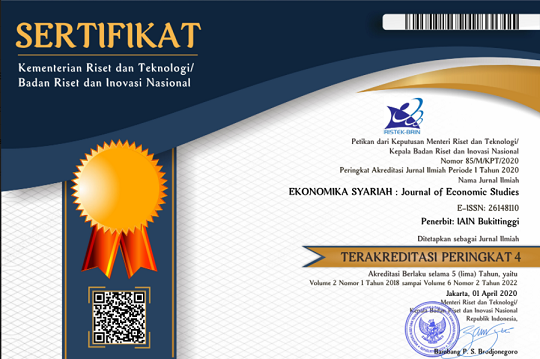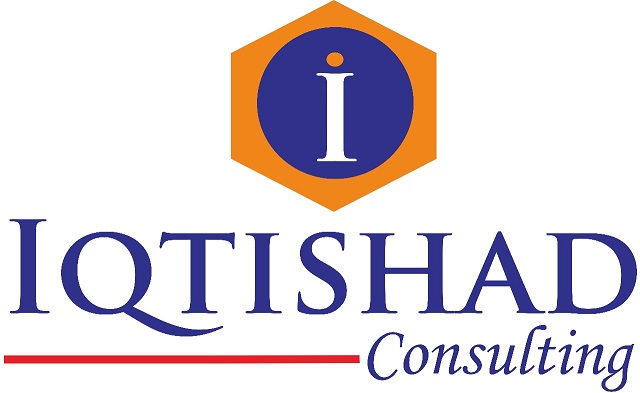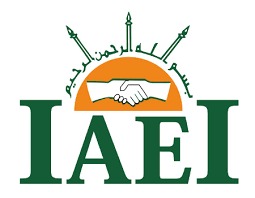Public perception of the revitalization of Indonesian Waqf Institution
DOI:
https://doi.org/10.30983/es.v7i1.6297Keywords:
Perception, Revitalization, Badan Wakaf IndonesiaAbstract
Indonesian Waqf Institution (BWI/Badan Wakaf Indonesia) was formed based on Law Number 41 of 2004 concerning Waqf. BWI has a firm legal standing within the national legal structure. However, several articles in the Waqf Law have an unfavorable impact on the performance of BWI. Waqf's potential and actualization gap is still significant amidst low public trust in Nazir's governance. BWI is also considered not optimal in developing the potential of Waqf in Indonesia. This study aimed to determine public perceptions regarding the proposed revitalization of BWI duties, functions, and authorities in the more ideal Waqf Management rules. The data collection method used was a questionnaire distributed to the public. The data were analyzed by descriptive statistics. The results showed that the community less agreed with expanding the role of BWI. It is possible due to the lack of public knowledge regarding issues related to the management and development of Waqf that are currently occurring. The community has not been able to adapt to changes, and it tends to be challenging to revitalize BWI's duties, functions, and authorities in waqf regulations.
Badan Wakaf Indonesia (BWI) dibentuk berdasarkan Undang-Undang Nomor 41 tahun 2004 tentang Wakaf. BWI memiliki kedudukan hukum yang kuat dalam struktur hukum nasional. Namun, beberapa pasal yang tercantum dalam Undang-Undang Wakaf justru berdampak kurang baik terhadap kinerja BWI. Gap potensi dan aktulisasi Wakaf dinilai masih sangat besar, ditengah rendahnya kepercayaan publik pada tata kelola Nazir. BWI juga dinilai belum optimal dalam mengembangkan potensi wakaf di Indonesia. Penelitian ini bertujuan untuk mengetahui persepsi masyarakat terkait adanya revitalisasi tugas, fungsi dan wewenang BWI dalam aturan Pengelolaan Wakaf yang lebih ideal. Metode pengumpulan data yang digunakan adalah kuesioner yang disebar kepada masyarakat. Data yang diperoleh dianalisis secara statistik deskriptif. Hasil penelitian menunjukan bahwa masyarakat kurang setuju dengan perluasan peran BWI. Hal ini dimungkinkan karena kurangnya pengetahuan masyarakat terkait isu permasalahan terkait pengelolaan dan pengembangan wakaf yang saat ini terjadi. Masyarakat belum dapat beradaptasi dengan perubahan dan cenderung enggan terhadap upaya revitalisasi tugas, fungsi dan wewenang BWI dalam regulasi wakaf.References
Abd. Jalil, M. I. (2020). ISSUES AND CHALLENGES OF WAQF PRACTICE IN MALAYSIA: A REVIEW. Labuan E-Journal of Muamalat and Society (LJMS), 80–86. https://doi.org/10.51200/ljms.v14i.2868
Abidillah, A. F. (2022). Productive Waqf Model as an Alternative for Village-Owned Enterprises Business (BUMDs) Expansion. EKONOMIKA SYARIAH: Journal of Economic Studies, 5(2), 153–166.
Agama, K. (2021). Ministry of Religion’s Waqf Information System.
Ali, K. M., & Hassan, M. K. (2019). Revitalization of Waqf for Socio-Economic Development, Volume II. Springer.
BAPPENAS. (2015). Masterplan Arsitektur Keuangan Syariah Indonesia. BAPPENAS.
Foundation, C. A. (2022). World Giving Index 2022.
Haneef, M. A. M., Kamil, N. K. B. M., & Qurroh Ayuniyyah. (2017). DEVELOPMENT OF WAQF IN INDONESIA: THE SWOT ANALYSIS OF INDONESIA WAQF BOARD (BWI). AL-INFAQ: Jurnal Ekonomi Islam, 8(2), 136–150.
Hatim, A. (2021). Reformasi Peran Badan Wakaf Indonesia (BWI) dalam Ekosistem Wakaf Nasional sebagai Jalan Menuju Reforma Agraria. Jurnal Hukum Lex Generalis, 2(9), 804–821.
Hidayatullah, & Sidqi, F. A. (2019). REVITALISASI BADAN WAKAF INDONESIA (BWI) ANALISIS KRITIS UNDANG-UNDANG NOMOR 41 TAHUN 2004 TENTANG WAKAF. Al’Adl, X(1), 15–32.
Joni, Y., & Zuleika, A. (2018). WAKAF SEBAGAI ALTERNATIF PENGELOLAAN DANA TABARRU’PADA TAKAFUL. EKONOMIKA SYARIAH: Journal of Economic Studies, 1(2).
Machmud, A., Hidayat, Y., & Ahmad, S. (2018). Tata Kelola dan Akuntabilitas Pengelolaan Wakaf. Menyiapkan Bangsa Yang Berkeadilan Dalam Menyongsong Indonesia Satu Abad, 39–61.
Mahfud, R. (2011). Al-Islam. Erlangga.
Makhrus. (2018). Dinamika Kebijakan Negara dalam Pengelolaan Wakaf di Indonesia. Jurnal Sains Sosial Dan Humaniora, 2(41), 209–224.
merdeka.com. (2021). Mengupas Wakaf Uang dan Potensinya di Indonesia. In https://www.merdeka.com/khas/mengupas-wakaf-uang-dan-potensinya-di-indonesia-mildreport.html.
Nafis, M. C. (2014). Wakaf Dari Masa Ke Masa Di Indonesia.
Nugraha, A. L., Susilo, A., Huda, M., Athoillah, M. A., & Rochman, C. (2022). Waqf Literacy: The Dynamics of Waqf in Indonesia. Journal of Islamic Economics and Finance Studies, 3(2), 102. https://doi.org/10.47700/jiefes.v3i2.5082
Putra, T. W., & Fildayanti, D. A. (2021). REVITALIZATION OF WAQF MANAGEMENT FOR SOCIAL ECONOMIC DEVELOPMENT OF EAST LUWU. Al-Risalah, 12(2), 297–311. https://doi.org/10.34005/alrisalah.v12i2.1403
Razak, S. H. A. (2020a). Zakat and waqf as instrument of Islamic wealth in poverty alleviation and redistribution: Case of Malaysia. International Journal of Sociology and Social Policy, 40(3/4), 249–266.
Razak, S. H. A. (2020b). Zakat and waqf as instrument of Islamic wealth in poverty alleviation and redistribution. International Journal of Sociology and Social Policy, 40(3/4), 249–266. https://doi.org/10.1108/IJSSP-11-2018-0208
Rifai, F. (2020). Analisis Sistem Pengawasan Wakaf di Indonesia. 1st Annual Conference On Ihtifaz: Islamic Economics, Finance, and Banking (ACI-IJIEFB), 115–125.
Rimanto. (2021). Revitalisasi Otoritas Badan Wakaf Indonesia (Studi Tentang Yuridis Dan Eksistensi). Universitas Islam Negeri Raden Intan Lampung.
Rozalinda. (2015). Manajemen Wakaf Produktif. Raja Wali Press.
Rusydiana, A. S., Hidayat, Y., Widiastuti, T., & Rahayu, S. S. (2021). Cash waqf for developing Islamic economy: Case study in Indonesia. Al-Uqud: Journal of Islamic Economics, 5(1), 43–59.
Sugianto, S., Soemitra, A., Yafiz, M., Dalimunthe, A. A., & Ichsan, R. N. (2022). The implementation of waqf planning and development through Islamic financial institutions in Indonesia. JPPI (Jurnal Penelitian Pendidikan Indonesia), 8(2), 267. https://doi.org/10.29210/020221430
Syarief, E. (2021). Optimization of waqf land management in Indonesia. International Journal of Research in Business and Social Science (2147-4478), 10(2), 270–283.
Syed Khalid Rashid, S. K. R. (2018). Potential of Waqf in Contemporary World. Journal of King Abdulaziz University Islamic Economics, 31(2), 53–69. https://doi.org/10.4197/Islec.31-2.4
Downloads
Additional Files
Published
How to Cite
Issue
Section
Citation Check
License
Copyright (c) 2023 Nur Hidayah, Tira Mutiara, Muhamad Nadratuzzaman Hosen, Diah Larasati, Abdul Wahab

This work is licensed under a Creative Commons Attribution-ShareAlike 4.0 International License.
Authors who publish with this journal agree to the following terms:
- Authors retain copyright and grant the journal right of first publication with the work simultaneously licensed under a Creative Commons Attribution-ShareAlike 4.0 International License that allows others to share the work with an acknowledgment of the work's authorship and initial publication in this journal.
- Authors are able to enter into separate, additional contractual arrangements for the non-exclusive distribution of the journal's published version of the work (e.g., post it to an institutional repository or publish it in a book), with an acknowledgment of its initial publication in this journal.
- Authors are permitted and encouraged to post their work online (e.g., in institutional repositories or on their website) prior to and during the submission process, as it can lead to productive exchanges, as well as earlier and greater citation of published work (See The Effect of Open Access).




